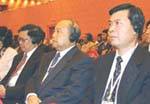| Saturday, November 10, 2001, updated at 15:46(GMT+8) |
WTO Meeting Opens in Doha Amid Intense Security |
 Trade ministers of the 142 World Trade Organization (WTO) members started talks Friday in Doha amid intense security in a fresh bid to launch a new round of multilateral talks to cut global trade barriers. Trade ministers of the 142 World Trade Organization (WTO) members started talks Friday in Doha amid intense security in a fresh bid to launch a new round of multilateral talks to cut global trade barriers.
|
|
 |
|
|
 |
|

(3) WTO 4th Ministerial Meeting Opens in Doha
Trade ministers of the 142 World Trade Organization (WTO) members started talks Friday in Doha amid intense security in a fresh bid to launch a new round of multilateral talks to cut global trade barriers.
In a speech at the opening ceremony, WTO Director-General Mike Moore stressed the importance of initiating new negotiations to liberalize global trade.
The objectives of the new round are "the further liberalization of trade, the creation of more jobs, the strengthening of the multilateral system and the extension of the full benefits of that system to countries now marginalized by poverty," he said.
During the five-day negotiation marathon, trade ministers are expected to start hard bargaining over a number of thorny issues, including agriculture subsidies, the implementation of previous agreements and intellectual property rights.
They will also approve a package of agreements on terms for China's accession to the world trade watchdog Saturday, ending the country's 15-year quest for its WTO membership.
The meeting is being held at a heavily guarded beachfront hotel,with police toting assault rifles guarding every entrance and roads running through its perimeter closed off.
The gathering is the fourth full ministerial since 1995 when the WTO was created through the Uruguay Round to replace the General Agreement on Tariffs and Trade (GATT).
Ministers Face Thorny IssuesThey will have to resolve a daunting number of thorny issues if they want to avoid a repeat of the failure in the 1999 Seattle conference.
The following are the major items on the table:
Agenda for New Round All WTO members have reached a consensus that the so-called built-in agenda agreed upon at the 1986-1994 Uruguay Round, namely the talks to further reduce barriers to global trade in agriculture and services, should go ahead. And the talks on the two fronts were opened in early 2000.
But the developed camp, particularly the European Union (EU) and Japan, wants a broad round, covering all industrial products, investment and competition policies, as well as environmental and labor standards.
Despite strong lobbies by rich countries since the Seattle conference, most developing countries remain unenthusiastic about a round covering competition and other areas that are rather new for them.
The developing countries are expected to press for their demand to focus the new round on the theme of development -- implementation of previous commitments made in the Uruguay round.
Agriculture Liberalizing farm produce trade has long been sought by the United States and the Australia-led Cairns Group, composed of 18 farm produce-exporting nations which provide no subsidies to their farmers. They want the EU and Japan to eventually eliminate all subsidies within a negotiated definite time table.
The EU has indicated readiness to negotiate but refuse to make any advance commitments. Japan and South Korea remain firm against talks to open their farm produce market, citing the agriculture's so-called multi-functionality, such as protection of rural environment and food security.
Implementation This is a primary demand of most developing countries, which want to be given more time to implement market opening agreements and urge developed countries to live up to market access commitments. They insist that they benefit little from the Uruguay Round. The U.S. has softened its stance on the issue which it said "no" in Seattle.
Intellectural Property Rights A possible deal breaker at the Doha meeting. Developing countries led by Brazil and South Africa are seeking a more flexible interpretation of the accord to allow them to override patents to enable them to supply their populations with cheap, generic drugs in case of a medical crisis.
The U.S. and Switzerland, both major pharmaceutical exporters, maintain that the trade-related aspects of intellectual property rights (TRIPS) accord should not be weakened. They say the TRIPS agreement is already flexible enough to enable poor countries to deal with health crisis.
Enironment The EU insists environmental issues be included in any new round of trade talks. It calls on the WTO to address worries over the compatibility between environmental policies and trade policies, protection of consumer rights and public health concerns.
The developing countries, backed by the U.S. , insist that the existing WTO accords have fully covered all legitimate environmental concerns. They fear the issue could be used to deny entry of their products.
Labor Standards The EU, an advocate of the issue, says that trade should be linked with the protection of workers' basic rights. The U.S., which was keen on talking about the issue in Seattle, says the issue of labor rights is not part of its agenda.
Developing countries fear EU's demand as a veiled attempt to weaken their competitiveness. The contentious issue could be dropped this time around.
Anti-dumping Japan, South Korea, Brazil and some emerging economies demand that anti-dumping rules contained in the Uruguay Round's anti-dumping agreement be clarified and improved.
Describing the anti-dumping rules as "a convenient tool for protectionists," they accused the U.S. of abusing the rules by imposing punitive tariffs to protect its own industries, especially steel, from competition.
The U.S., which has bluntly denied the charges, says "no way" to renegotiate the agreement.
|
|
|
|